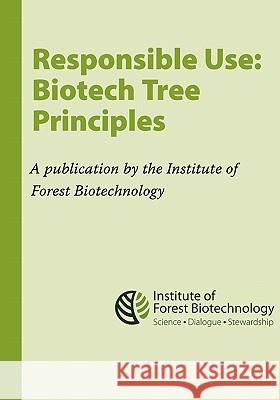Responsible Use: Biotech Tree Principles: Principles for Using Biotech Trees by the Institute of Forest Biotechnology » książka
Responsible Use: Biotech Tree Principles: Principles for Using Biotech Trees by the Institute of Forest Biotechnology
ISBN-13: 9781456563318 / Angielski / Miękka / 2011 / 36 str.
Responsible Use: Biotech Tree Principles: Principles for Using Biotech Trees by the Institute of Forest Biotechnology
ISBN-13: 9781456563318 / Angielski / Miękka / 2011 / 36 str.
(netto: 38,01 VAT: 5%)
Najniższa cena z 30 dni: 39,81
ok. 16-18 dni roboczych.
Darmowa dostawa!
People have always had, and will continue to have, an interdependence with forests. Given the reality of a growing world population, more productive, healthy, and sustainably managed forests are needed. We rely on the services forests provide, like cleaning water and slowing climate change by absorbing atmospheric carbon. We need sustainably managed trees to produce paper, packaging, homes, food, and renewable energy. We need to keep our forests healthy and productive to fulfill all these needs and to protect forested areas from decline. These Principles are crucial because biotechnology is increasingly being used on trees and in forests. These Principles were developed in recognition that responsibly used forest biotechnology has the potential to benefit society, economies, and the environment. Today there are invasive threats damaging our forests. We face a changing climate, deforestation, and illegal logging. Forest biotechnology can be a powerful tool against many of these threats. Scientists have already designed biotech trees that are resistant to disease and changing climates, growth rates that produce more wood fiber with fewer inputs on less land than conventional trees, and biometric tools to police illegally traded timber. Today there are over one million biotech poplar trees with the Bt gene that were established on commercial plantations in China in 2003. Genetic work on cacao trees is being explored to help the species that is susceptible to viruses in much of the world. Similarly, biotech papaya trees saved that industry in Hawaii from being destroyed by the Ring Spot virus. Hundreds of researchers and organizations around the world have helped to pioneer these technologies in a responsible manner. Forest biotechnology is also being practiced in new ways, in new places, and by new researchers. But not every nation has a robust regulatory system or opportunities for interested public stakeholders to engage in issues important to them. We need the Responsible Use: Biotech Tree Principles to help guide long-term stewardship of biotech trees regardless of where they are developed or used. We need these Principles to foster a higher standard in biotech tree management, biotech forest stewardship, and ethical behavior. Through an open dialogue that continues today, a broad spectrum of stakeholders, including university researchers, conservation and environmental groups, and industry leaders, created the Responsible Use: Biotech Tree Principles that are guided by these core beliefs: Biotech trees should benefit people, the environment, or both Risks and benefits of biotech trees must be assessed Transparency is vital and stakeholders must be engaged Social equity and indigenous rights are important and must be respected Biotech tree use must follow regulations in the country of their application These Principles are unique because they are the first, and only, guidelines that include the entire biotech tree lifecycle from conception to final product. The Institute of Forest Biotechnology will continue to manage this initiative in a transparent way. Please visit the website dedicated to strengthening these principles at www.responsibleuse.org."
Zawartość książki może nie spełniać oczekiwań – reklamacje nie obejmują treści, która mogła nie być redakcyjnie ani merytorycznie opracowana.











